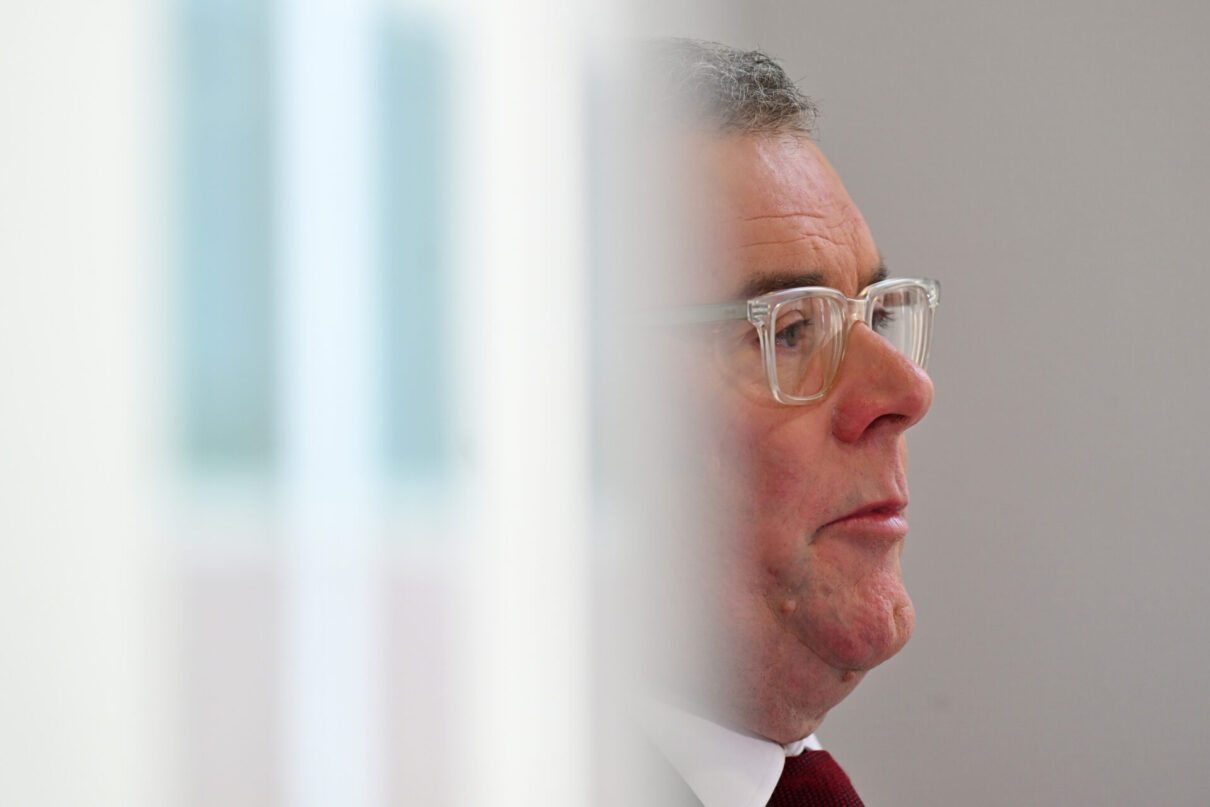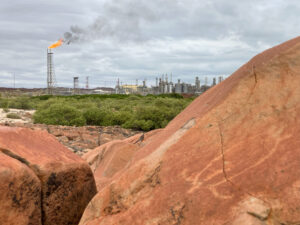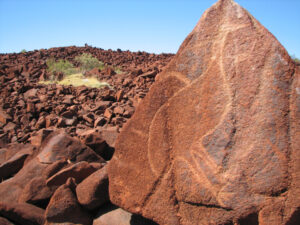Yes, Minister. The secret haggling behind the destruction of an ancient treasure.

It tells you a lot about who wields power in Australia that Woodside is being allowed to haggle in secret over the conditions of the North West Shelf expansion
Woodside Energy is apparently baulking at strict new limits on nitrous oxide emissions the Albanese government wants to impose on its massive gas project to protect the ancient Indigenous rock art at Murujuga in WA.
The emissions limits are the “major sticking point” in the way of final approval for Woodside’s North West Shelf gas development, according to the AFR Rock art protections behind Woodside North West Shelf gas project delay.
Which begs the question: why is this a negotiation?
It tells you a lot about who wields power in Australia that Woodside is being allowed to haggle in secret over the conditions.
In May, Environment Minister Murray Watt gave provisional approval to a 45-year extension of the oil and gas giant’s liquid natural gas export hub on the Burrup, and an associated gas power plant.
This was subject to “strict conditions” – but they were never made public.
Supposedly, the secrecy was imposed to provide “procedural fairness” to Woodside. The gas giant was given 10 days to respond. It missed the deadline.
Four months later, the conditions are still cloaked in secrecy – and Woodside is still chipping away at them behind closed doors. So much for transparency.
Woodside’s gas facilities are adjacent to what many experts consider the most significant Indigenous rock art site in the world: The Murujuga Cultural Landscape.
It contains a huge concentration of images, known as petroglyphs, etched into the rocks. Some date back up to 50,000 years, depicting ancient megafauna and the oldest known image of a human face.
Murujuga has recently been listed on UNESCO’s World Heritage Register. But don’t assume that means it is safe.
The trouble is that burning gas releases pollutants that can damage the rock art. Nitrous oxides are the most concerning. These emissions can eat away a protective natural varnish, formed over thousands of years, that protects the rock art.
In the past, Woodside has dismissed calls by archaeologists and other rock art specialists to put in place available technology to curtail the emissions, claiming this is too expensive.
Sadly, there is now clear evidence of damage to rock containing the art over an extensive area near where Woodside’s facilities are located. Tiny holes pit the surfaces of the rocks, compromising the natural varnish that protects the petroglyphs. This may accelerate their destruction.
Ensuring there is no further pollution threat to the rock art is vital. Australia has a formal obligation to protect the World Heritage site. Physics and chemistry are impervious to political chicanery. If emissions degrade the rock art, an extraordinary cultural heritage produced over tens of thousands of years could be lost within decades.
So, good on environment minister Murray Watt for imposing “strict conditions”, even though they remain cloaked in a veil of secrecy.
In a well-functioning democracy, here’s what might happen.
The conditions imposed on the provisional approval would be made public.
The light of transparency would allow proper scrutiny and discourage government backsliding.
Rather than being allowed to whittle away at the emissions limits behind closed doors, Woodside would be told to accept them, or walk away.
Between the Lines Newsletter
The biggest stories and the best analysis from the team at the Australia Institute, delivered to your inbox every fortnight.
You might also like
As Murray Watt signs the death warrant for an ancient treasure, The Australia Institute launches a heartbreaking Murujuga documentary
The federal government has signed the death warrant for Australia’s most significant ancient artistic treasure, the Indigenous rock art at Murujuga in north Western Australia.
The secret deal with ‘Big Gas’ that threatens heritage listed, ancient rock art
A veil of secrecy hangs over the conditions that will apply to Woodside Energy’s massive gas export project on the Burrup Peninsula in WA – the kind of secrecy that corporate power can command.
Unfinished Business: Towards a settlement on Aboriginal land rights in the ACT
The Australia Institute has today published a discussion paper on the barriers to progress on Aboriginal land rights in the ACT. The paper explores the issues that need to be resolved before the ACT Government can make progress on treaty discussions. Key Findings: The transfer of the land of the ACT from NSW to the


